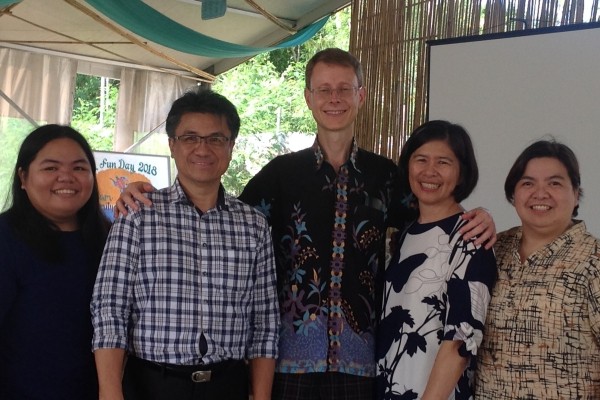
PSU Systems Analysis team (L to R) Gianina Decano, Dr Patrick Regoniel, Marissa Pontillas, Eva Ponce De Leon with component leader Dr Carl Smith (centre) from the University of Queensland (Photo: G. Sheehan).
Systems thinking to reach young minds
December 20 2018
CCRES systems analysis tools SESAMME and SYSTORY are being integrated into lesson plans for elementary, junior high, senior high and college students at Palawan State University (PSU) in the Philippines.
A new K-12 curriculum rolled out in 2013, followed by implementation of Grade 11 and 12 curriculums just two years ago, has a vision of “holistically developed Filipinos with 21st Century skills”.
“Some of the key skills that we are building in students are critical thinking and complex problem solving, and systems thinking is a component of that,” said Marissa Pontillas, Faculty member at PSU’s College of Teacher Education.
Marissa was part of CCRES’s Systems Analysis team that developed the tools to assist systems thinking, including the SYSTORY and SESAMME apps which can be used on iPads, iPhones and – coming soon – Android devices, Windows PCs and Mac computers. She recognized the opportunity to integrate the tools into the curriculum at Palawan State University and beyond.
“We want our curriculum to be contextualized and localized. We always want to connect what our students are learning with their situation and their environment,” said Marissa.
“I think the fact that these tools were developed with El Nido as the pilot site will help the students become better systems thinkers.
“Systems thinking allows them to have a wider perspective – not just of the short term, but of the long-term too. They will think about the long-term effects and consequences of what we do with our resources, what activities we do, and the pressures that affect these resources and activities.”
So far, 22 PSU faculty members have been introduced to the tools in a recent seminar, to see their application and consider how they could be mapped to the curriculum and integrated into their teaching.
“We asked the participants to develop lesson plans to show how they would integrate them,” said Marissa.
“Once they’ve been further developed, we’ll share the lesson plans with other teachers to use as guides.
“Our younger students are interested in applications they can explore, so by using these tools, teachers will not find it difficult to teach systems thinking or topics like ecosystems.”
“In using the apps in teaching, the students will be motivated to learn because their generation enjoys innovative technology and gadgets,” said Rolex Sudara, a PSU teacher who has been involved in developing the lesson plans.
The lesson plans and teaching guides are still under development, but the aim is for CCRES knowledge tools to be made available to both basic education and college teachers across Palawan – for use in science and other disciplines.
The team also conducted a training workshop for 30 PSU students on the use of My Future My Oceans – a tool for fostering sustainable behaviours in low resource coastal households.



